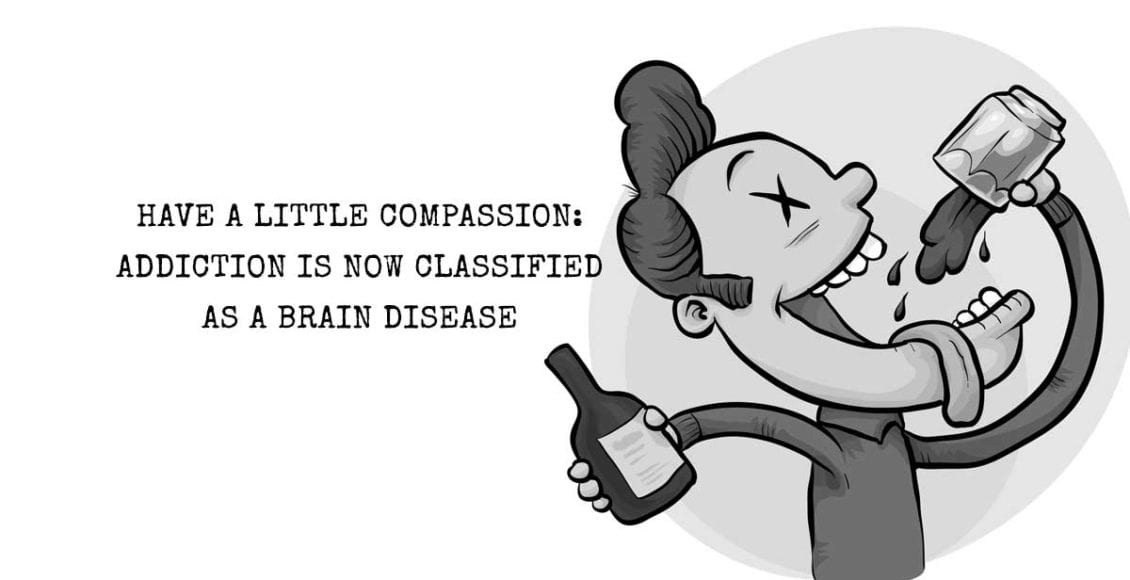Addiction. The dictionary definition is: “a physical or psychological need for a habit-forming substance, such as a drug or alcohol. In physical addiction, the body adapts to the substance being used and gradually requires increased amounts to reproduce the effects originally produced by smaller doses.”
Seems pretty straightforward, right? If it is, though, why do we as a society continue to be confounded by addicts’ behaviors and choices? Why do we continue to stigmatize addiction and addicts? Perhaps it’s because we really don’t fully understand addiction.
The most recent studies, however, have made leaps and bounds in this area to show conclusively that addiction is a disease of the brain, not a behavioral disorder.
“Our liquor was but a symptom.” (Alcoholics Anonymous p. 64)
This sentence was originally written by Bill Wilson, the co-founder of Alcoholics Anonymous, in the 1930s. It would seem that often, the people who truly understood addiction were, not surprisingly, the addicts in recovery. It wasn’t until 2011 when a massive study combining some 80 experts and four years of intensive research was released by the American Society for Addiction Medicine (ASAM) conclusively defined addiction as a clinical brain disorder. Bill was right, it turned out: liquor, (or pills, food, sex, gambling, etc.) is but a symptom of a chronic brain disease.
Backlash
Shortly after ASAM released its findings, scientists started challenging them. While some of the arguments postulated are interesting to ponder, none of them hold up under scientific scrutiny. The facts back up ASAM. As Dr. Michael Miller, former president of ASAM who oversaw the new definition, states, “At its core, addiction isn’t just a social problem or a moral problem or a criminal problem. It’s a brain problem whose behaviors manifest in all these other areas.”
The Constant Struggle
Whether it’s the guy living on the street and drinking out of a paper bag or the waiter at restaurant who seems a little unsteady on his feet or the college professor who goes home each day to drink to blackout every night, addicts are everywhere. The shame of living with an addiction is absolutely terrifying: you feel constantly guilty, constantly scared, you’re constantly in pain and your entire life is a complete and utter lie. You hear people say things like, “hey, maybe you should slow down a little,” or “I think you’ve had enough for the night” and you want to start screaming. How can they possibly know you can’t slow down, it will never be enough, and you will always, always need more? It seems like a never-ending battle.
A Chronic, Terminal, but Treatable Illness
As an alcoholic in recovery, one of the most helpful discoveries I made was along these exact lines: I am a sick person. As an addict you feel like a bad person or a corrupt person or a morally unfit person. The reality, however, is that we are just sick people. We have a disease, that disease is called addiction, and we need treatment for our illness. Not unlike a diabetic who needs insulin or a cancer patient getting chemotherapy, the only way our chronic, terminal disease is manageable is by rigorous treatment. It means probably a rather unpleasant detox, a lifetime of vigilance, possible setbacks (relapses), and a stable, solid support system.
My experience in recovery has been, however, that this illness can be treated. It will never be cured -I will always have alcoholism, and my disease rears its head occasionally in rather odd and ugly ways- but I haven’t had a drink for almost two years and prior to that I spent years drinking such quantities that doctors are amazed that I am still alive. I have an amazing support system and my world is bigger now than it ever was when I was drinking. My life now is a fairy tale, and if you told Drunk Dondi 3 years ago that it would look like this, she’d never believe you.
I have always maintained that the only way to really understand addiction is to become an addict (but I don’t recommend doing so). If, however, you’re struggling with a close friend or family member who is an addict or alcoholic, consider that they are just a sick person who needs treatment for their illness, and what you can do to perhaps help them onto the road to recovery. Sometimes, there’s very little you can do…but there are support groups out there to help you, too.


